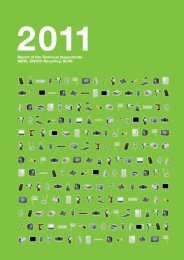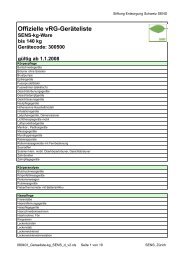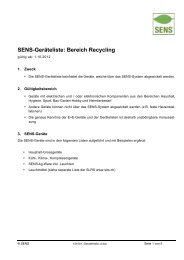Annual Report - Sens
Annual Report - Sens
Annual Report - Sens
You also want an ePaper? Increase the reach of your titles
YUMPU automatically turns print PDFs into web optimized ePapers that Google loves.
Interview<br />
e-Recycling:<br />
consumption and trends<br />
Mr Heim, what are the current trends in consumer<br />
behaviour and the use of natural resources?<br />
Thomas Heim: The medium-term trends in the consumption<br />
of most of the major resources are rising all over the world.<br />
And when I refer to resources I’m including both materials and<br />
energy. As a rule the savings achieved by means of more efficient<br />
technologies and more recycling are offset by incre ased<br />
consumption. Overall, as regards our environmental footprint,<br />
we are living beyond our means. Whereas here in Switzerland<br />
a great deal has been done to save energy in recent decades,<br />
efforts to recycle materials are limited to relatively few types of<br />
waste. Hence, particularly when it comes to the efficient use<br />
of materials – plastics, metals and chemicals – there remains<br />
a great deal of untapped potential, which technical innovations<br />
and changes in consumer behaviour could exploit.<br />
“As a rule the savings achieved by means<br />
of more efficient technologies and<br />
more recycling are offset by increased<br />
consumption.”<br />
I don’t doubt that the relevant innovations are ‘doable’. The real<br />
question is whether our economy can be adapted to reducing<br />
the depletion of natural resources. So far no one has been able<br />
to demonstrate in practice that ‘green growth’ is feasible – the<br />
necessary, radical separation of resource consumption from<br />
eco nomic growth is apparent merely in approach. However, I’m<br />
more optimistic in this respect than many of our representatives<br />
from the business community. ‘Business as usual’ is definitely<br />
the wrong way of going about solving the resource problem.<br />
How can we create incentives to make consumers<br />
behave responsibly and recognise the need to use<br />
resources efficiently?<br />
On the one hand, it’s the consumers who decide what to<br />
consume, but first and foremost it is the producers who make<br />
the products that throughout their life necessitate the consum<br />
ption of more or fewer resources. Quite a lot is already<br />
being done at both levels by informing people and through<br />
14 SENS <strong>Annual</strong> <strong>Report</strong> 2011<br />
voluntary initiatives, based on marketing considerations of<br />
course. However, we still need to increase our efforts. For<br />
example, customers can be better educated as to the effects<br />
on the environment and the depletion of resources these<br />
products cause. Large companies can use their market power<br />
more effectively to demand more efficient use of resources<br />
throughout the supply chain. Moreover, we should consider<br />
more unconventional ideas: people could be allowed to buy<br />
a notebook made of aluminium only if they take back the same<br />
quantity of aluminium, copper, etc., in return. Or a company<br />
could obtain maximum added value from a certain quantity of<br />
copper instead of from a man hour as is usually done now.<br />
Ideas like these may encounter opposition, but it is important<br />
to remember that genuine innovations often spring from what<br />
are initially crazy ideas which are neither taken seriously nor<br />
thought through.<br />
“Large companies can use their market<br />
power more effectively to demand more<br />
efficient use of resources throughout<br />
the supply chain.”<br />
Do we need statutory regulations to ensure we treat<br />
resources responsibly or can manufacturers set trends,<br />
for example by making products easy to recycle,<br />
or optimising product design?<br />
Opinions are just as divided on this issue as ever. Some<br />
consider the manufacturers responsible players who consider<br />
the challenges of the robust world of business, including the<br />
resource problem, and always decide in favour of the good<br />
of the whole. Others view manufacturers as if they were idiots<br />
who gobble up resources, only to end up in tears when these<br />
run out. Presumably the reality lies somewhere between the<br />
two extremes. Bureaucratic solutions are not what I would<br />
recommend to improve this situation. Tailor-made regulations<br />
could indeed lead to better conditions and consequently<br />
favour those companies at the top end of the distribution<br />
curve. However, the existing statutory instruments are directed<br />
at resource efficiency only in part. This should be changed
















